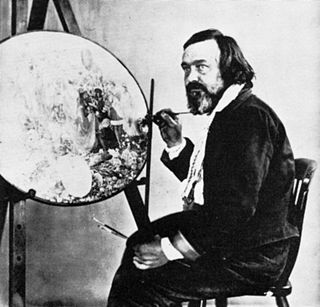
Richard Dadd was an English painter of the Victorian era, noted for his depictions of fairies and other supernatural subjects, Orientalist scenes, and enigmatic genre scenes, rendered with obsessively minuscule detail. Most of the works for which he is best known were created while he was a patient in Bethlem and Broadmoor hospitals.

Broadmoor Hospital is a high-security psychiatric hospital in Crowthorne, Berkshire, England.

Rampton Secure Hospital is a high-security psychiatric hospital near the village of Woodbeck between Retford and Rampton in Nottinghamshire, England. It is one of three high-security psychiatric hospitals in England, alongside Ashworth Hospital in Merseyside and Broadmoor Hospital in Berkshire. It is managed by Nottinghamshire Healthcare NHS Foundation Trust.
The David Bennett Inquiry was held in the UK to look into the death of David "Rocky" Bennett on 30 October 1998 in a medium secure psychiatric unit in Norwich, after being restrained by staff.
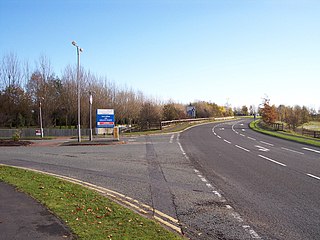
Ashworth Hospital is a high-security psychiatric hospital in Maghull, 10 miles (16 km) northeast of Liverpool. It is a part of Mersey Care NHS Foundation Trust, catering to patients with psychiatric health needs that require treatment in conditions of high security.

Carry On Doctor is a 1967 British comedy film, the 15th in the series of 31 Carry On films (1958–1992). It is the second in the series to have a medical theme. Frankie Howerd makes the first of his two appearances in the film series and stars alongside regulars Sid James, Kenneth Williams, Jim Dale, Charles Hawtrey, Joan Sims, Peter Butterworth, and Bernard Bresslaw. Hattie Jacques returns for the first time since Carry On Cabby four years earlier, while Barbara Windsor returns after her debut in Carry On Spying three years earlier. Carry On Doctor marks Anita Harris's second and final appearance in the series. The film was followed by Carry On Up the Khyber in 1968.
Kimathi Donkor is a London-based contemporary British artist whose paintings are known for their exploration of global, black histories. His work is exhibited and collected by international museums, galleries and biennials including London's National Portrait Gallery, the British Museum, the Diaspora Pavilion at the 57th Venice Biennial, the 29th São Paulo Art Biennial and the 15th Sharjah Biennial. He is of Ghanaian, Anglo-Jewish and Jamaican family heritage, and his figurative paintings depict "African diasporic bodies and souls as sites of heroism and martydom, empowerment and fragility...myth and matter".
Christine Dean FRCPsych is an English psychiatrist consulting at the Priory Hospital, Roehampton, the British Association of Performing Arts Medicine (BAPAM), The Helen Bamber Foundation, in her private practice and as a medical member of the Mental Health Review Tribunals, Ministry of Justice.
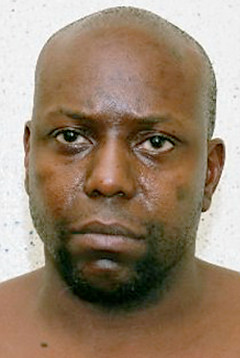
Peter Bryan is a British serial killer with schizophrenia who committed three murders between 1993 and 2004.

Edward Adamson was a British artist, "the father of Art Therapy in Britain", and the creator of the Adamson Collection.
AH vs West London Mental Health Trust was a landmark case in England, which established a legal precedent in 2011 when Albert Laszlo Haines (AH), a patient in Broadmoor Hospital, a high security psychiatric hospital, was able to exercise a right to a fully open public mental health review tribunal to hear his appeal for release. The case and the legal principles it affirmed have been described as opening up the secret world of tribunals and National Health Service secure units, and as having substantial ramifications for mental health professionals and solicitors, though how frequently patients will be willing or able to exercise the right is not yet clear.
Sir Robert Anthony Francis KC is a British barrister. He specialises in medical law, including medical and mental health treatment and capacity issues, clinical negligence and professional discipline. He has appeared as a barrister for and chaired several high-profile inquiries into medical controversies/scandals.
Errol Lloyd is a Jamaican-born artist, writer, art critic, editor and arts administrator. Since the 1960s he has been based in London, to which he originally travelled to study law. Now well known as a book illustrator, he was runner-up for the Kate Greenaway Medal in 1973 for his work on My Brother Sean by Petronella Breinburg.

Denzil Forrester is a Grenada-born artist who moved to England as a child in 1967. Previously based in London, where he was a lecturer at Morley College, he moved to Truro, Cornwall, in 2016.
Uzo Egonu was a Nigerian-born artist who settled in Britain in the 1940s, only once returning to his homeland for two days in the 1970s, although he remained concerned with African political struggles. According to Rasheed Araeen, Egonu was "perhaps the first person from Africa, Asia or the Caribbean to come to Britain after the War with the sole intention of becoming an artist." According to critic Molara Wood, "Egonu's work merged European and Igbo traditions but more significantly, placed Africa as the touchstone of modernism. In combining the visual languages of Western and African art, he helped redefine the boundaries of modernism, thereby challenging the European myth of the naïve, primitive African artist."
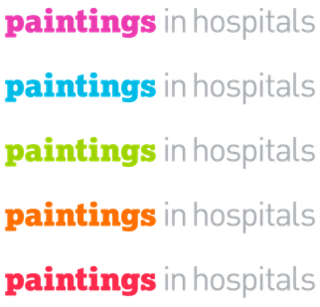
Paintings in Hospitals is an arts in health charity in the United Kingdom. Founded in 1959, the charity's services include the provision of artwork loans, art projects and art workshops to health and social care organisations. The charity's activities are based on clinical evidence demonstrating health and wellbeing benefits of the arts to patients and care staff.

Olaseni Lewis, a 23-year-old British man, died on 3 September 2010 at Bethlem Royal Hospital in London, United Kingdom, after police subjected him to prolonged physical restraint. Lewis had voluntarily sought care following the onset of acute mental health issues and died from cerebral hypoxia soon after, following actions that involved eleven officers of London's Metropolitan Police. After seven years of campaigning by Lewis' family and two inquiries by the Independent Police Complaints Commission (IPCC), a second coroners' inquiry was raised.
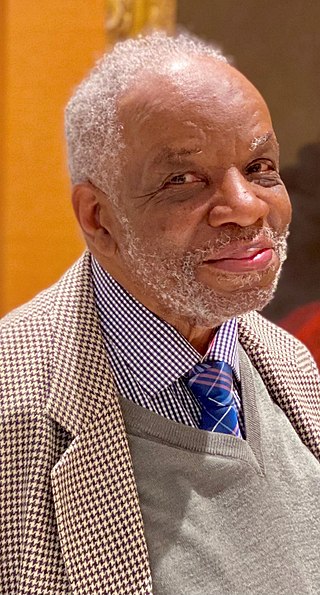
Aggrey Washington Burke FRCPsych is a British retired psychiatrist and academic, born in Jamaica, who spent the majority of his medical career at St George's Hospital in London, UK, specialising in transcultural psychiatry and writing literature on changing attitudes towards black people and mental health. He has carried out extensive research on racism and mental illness and is the first black consultant psychiatrist appointed by Britain's National Health Service (NHS).

Herschel Albert Prins (1928–2016) was a British professor of criminology. His career spanned over 60 years in work pertaining to forensic psychiatry, and his appointments included positions at the universities of Leeds, Loughborough, Leicester and Birmingham. His roles included HM probation inspectorate, parole board engagement, and involvement in mental health review tribunals and the mental health act commission. He worked with people with malicious activity, antisocial and disinhibited behaviour, unusual sexual deviations and people who behaved dangerously.

Orville Blackwood was a Jamaican-born British man, whose death at Broadmoor Hospital on 28 August 1991, following the administration of large doses of antipsychotic medications, resulted in wide media coverage after an inquiry into the circumstances surrounding his death. The inquiry published a report in 1993 titled 'Report of the committee of inquiry into the death in Broadmoor Hospital of Orville Blackwood, and a review of the deaths of two other Afro-Caribbean patients: "big, black and dangerous?".












